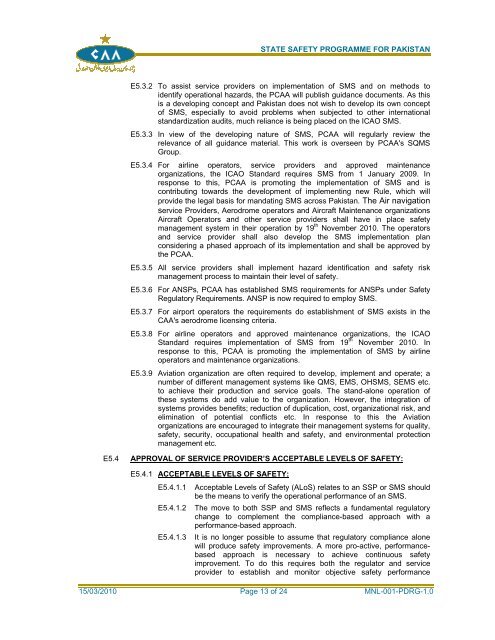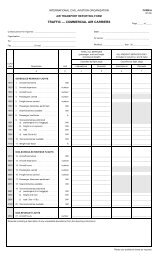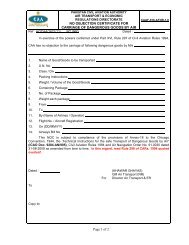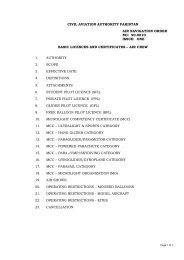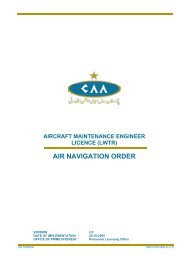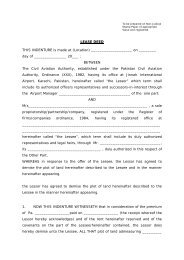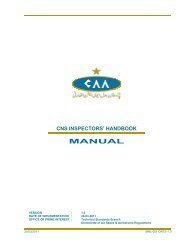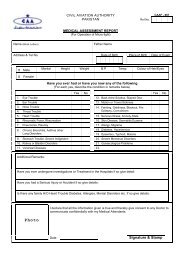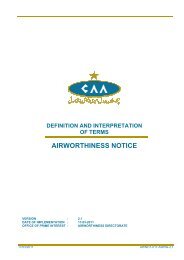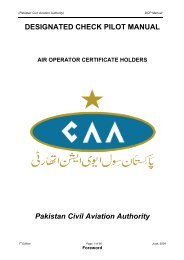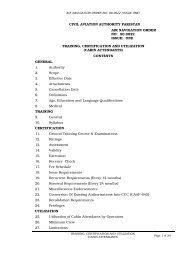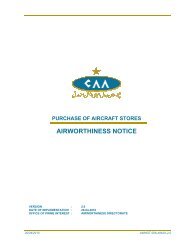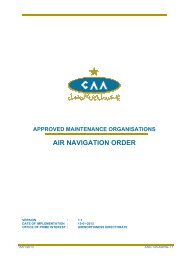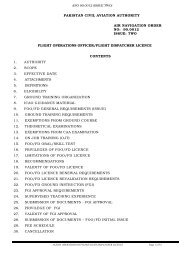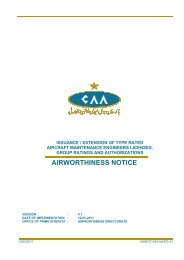state safety programme for pakistan manual - Civil Aviation Authority
state safety programme for pakistan manual - Civil Aviation Authority
state safety programme for pakistan manual - Civil Aviation Authority
You also want an ePaper? Increase the reach of your titles
YUMPU automatically turns print PDFs into web optimized ePapers that Google loves.
STATE SAFETY PROGRAMME FOR PAKISTANE5.3.2 To assist service providers on implementation of SMS and on methods toidentify operational hazards, the PCAA will publish guidance documents. As thisis a developing concept and Pakistan does not wish to develop its own conceptof SMS, especially to avoid problems when subjected to other internationalstandardization audits, much reliance is being placed on the ICAO SMS.E5.3.3 In view of the developing nature of SMS, PCAA will regularly review therelevance of all guidance material. This work is overseen by PCAA's SQMSGroup.E5.3.4 For airline operators, service providers and approved maintenanceorganizations, the ICAO Standard requires SMS from 1 January 2009. Inresponse to this, PCAA is promoting the implementation of SMS and iscontributing towards the development of implementing new Rule, which willprovide the legal basis <strong>for</strong> mandating SMS across Pakistan. The Air navigationservice Providers, Aerodrome operators and Aircraft Maintenance organizationsAircraft Operators and other service providers shall have in place <strong>safety</strong>management system in their operation by 19 th November 2010. The operatorsand service provider shall also develop the SMS implementation planconsidering a phased approach of its implementation and shall be approved bythe PCAA.E5.3.5 All service providers shall implement hazard identification and <strong>safety</strong> riskmanagement process to maintain their level of <strong>safety</strong>.E5.3.6 For ANSPs, PCAA has established SMS requirements <strong>for</strong> ANSPs under SafetyRegulatory Requirements. ANSP is now required to employ SMS.E5.3.7 For airport operators the requirements do establishment of SMS exists in theCAA's aerodrome licensing criteria.E5.3.8 For airline operators and approved maintenance organizations, the ICAOStandard requires implementation of SMS from 19 th November 2010. Inresponse to this, PCAA is promoting the implementation of SMS by airlineoperators and maintenance organizations.E5.3.9 <strong>Aviation</strong> organization are often required to develop, implement and operate; anumber of different management systems like QMS, EMS, OHSMS, SEMS etc.to achieve their production and service goals. The stand-alone operation ofthese systems do add value to the organization. However, the integration ofsystems provides benefits; reduction of duplication, cost, organizational risk, andelimination of potential conflicts etc. In response to this the <strong>Aviation</strong>organizations are encouraged to integrate their management systems <strong>for</strong> quality,<strong>safety</strong>, security, occupational health and <strong>safety</strong>, and environmental protectionmanagement etc.E5.4 APPROVAL OF SERVICE PROVIDER’S ACCEPTABLE LEVELS OF SAFETY:E5.4.1 ACCEPTABLE LEVELS OF SAFETY:E5.4.1.1 Acceptable Levels of Safety (ALoS) relates to an SSP or SMS shouldbe the means to verify the operational per<strong>for</strong>mance of an SMS.E5.4.1.2 The move to both SSP and SMS reflects a fundamental regulatorychange to complement the compliance-based approach with aper<strong>for</strong>mance-based approach.E5.4.1.3 It is no longer possible to assume that regulatory compliance alonewill produce <strong>safety</strong> improvements. A more pro-active, per<strong>for</strong>mancebasedapproach is necessary to achieve continuous <strong>safety</strong>improvement. To do this requires both the regulator and serviceprovider to establish and monitor objective <strong>safety</strong> per<strong>for</strong>mance15/03/2010 Page 13 of 24 MNL-001-PDRG-1.0


